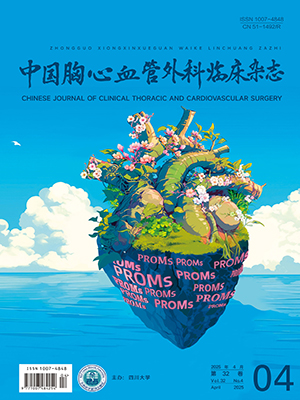| 1. |
Bray F, Ferlay J, Soerjomataram I, et al. Global cancer statistics 2018: GLOBOCAN estimates of incidence and mortality worldwide for 36 cancers in 185 countries. CA Cancer J Clin, 2018, 68(6): 394-424.
|
| 2. |
徐建峰, 周军庆, 魏德胜, 等. 食管癌术后肺部并发症的预测与对策. 中华胸部外科电子杂志, 2020, 7(4): 224-232.
|
| 3. |
中国抗癌协会肿瘤营养专业委员会, 中华医学会肠外肠内营养分会, 中国医师协会放射肿瘤治疗医师分会营养与支持治疗学组. 食管癌患者营养治疗指南. 中国肿瘤临床, 2020, 47(1): 1-10.
|
| 4. |
Onodera T, Goseki N, Kosaki G. Prognostic nutritional index in gastrointestinal surgery of malnourished cancer patients. Nihon Geka Gakkai Zasshi, 1984, 85(9): 1001-1005.
|
| 5. |
Xue Y, Zhou X, Xue L, et al. The role of pretreatment prognostic nutritional index in esophageal cancer: A meta-analysis. J Cell Physiol, 2019, 234(11): 19655-19662.
|
| 6. |
陈云开. 营养预后指数评估术前营养状态对食管癌术后并发症的预测价值. 临床合理用药杂志, 2020, 13(16): 139-140.
|
| 7. |
Kubo N, Ohira M, Tamura T, et al. Prognostic significance of baseline nutritional index for patients with esophageal squamous cell carcinoma after radical esophagectomy. Esophagus, 2017, 14: 84-90.
|
| 8. |
Hirahara N, Tajima Y, Fujii Y, et al. Preoperative prognostic nutritional index predicts long-term surgical outcomes in patients with esophageal squamous cell carcinoma. World J Surg, 2018, 42(7): 2199-2208.
|
| 9. |
徐世斌, 徐美青, 孙效辉, 等. 预后营养指数与食管鳞癌患者术后并发症和远期预后的相关性研究. 中国肿瘤临床, 2018, 45(15): 789-794.
|
| 10. |
Filip B, Scarpa M, Cavallin F, et al. Postoperative outcome after oesophagectomy for cancer: Nutritional status is the missing ring in the current prognostic scores. Eur J Surg Oncol, 2015, 41(6): 787-794.
|
| 11. |
李美端, 张娟, 杨胜生, 等. 营养预后指数评估术前营养状态对食管癌术后并发症的预测价值. 临床与病理杂志, 2018, 38(6): 1267-1273.
|
| 12. |
马明全, 姜宏景, 弓磊, 等. 胸腔镜与开放食管癌根治术后并发症及应激反应的比较研究. 中华胃肠外科杂志, 2016, 19(4): 401-405.
|
| 13. |
洪松铭. 术前营养评估指标对食管癌术后并发症的预测价值. 福建医科大学, 2019.
|
| 14. |
Nozoe T, Kimura Y, Ishida M, et al. Correlation of pre-operative nutritional condition with post-operative complications in surgical treatment for oesophageal carcinoma. Eur J Surg Oncol, 2002, 28(4): 396-400.
|
| 15. |
王青亮. 食管癌根治术后颈部吻合口瘘发生的影响因素分析. 淮海医药, 2020, 38(3): 287-289.
|
| 16. |
刘超. 长期饮酒对食管癌患者围手术期影响的初步研究. 泰山医学院, 2018.
|




